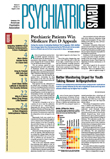A new analysis of a high-risk clinical trial population finds that antidepressant users were more likely to develop type 2 diabetes than were individuals who didn't use those drugs.
The multicenter Diabetes Prevention Program tested metformin against either placebo (plus lifestyle recommendations) or an intensive lifestyle intervention focusing on a low-fat diet, physical activity, and weight reduction among a population of patients at particularly high risk for impaired glucose tolerance or type 2 diabetes. These patients included the elderly, persons with a family history of the disease, overweight individuals, women with a history of gestational diabetes, and minority populations. Metformin is an antidiabetic drug that lowers blood sugar and increases insulin sensitivity.
Overall, the study of 3,187 participants found that the intensive lifestyle intervention reduced onset of diabetes by 58 percent, and metformin did so by 31 percent, compared with placebo.
These benefits caused the trial to be stopped early, and results were published in 2002.
However, further study of the results pointed to the conclusions about antidepressant use and diabetes, said study co-investigator Richard R. Rubin, Ph.D., an associate professor of medicine and pediatrics at the Johns Hopkins University School of Medicine.
Antidepressant use doubled the risk of diabetes in the placebo arm of the study compared with people who did not use those medications and tripled the risk among the intensive lifestyle group, Rubin said at the American Diabetes Association's 2006 Scientific Sessions. There was no difference in the metformin arm. Rubin is the association's incoming president and is helping to prepare an article on this aspect of the program for future publication.
Actual depression was not the key factor, said Rubin. Higher Beck Depression Inventory scores did not predict development of diabetes. Antidepressant use thus may have been a marker for serious depression at some time, even if it had been brought under control by medication, he said in an interview.
Nor did the type of antidepressant apparently matter, said Rubin. About 76 percent of those taking antidepressants used SSRIS, but the effects were the same as with other classes of drugs.
He noted that patients in the Diabetes Prevention Program were already at high risk for diabetes, and he cautioned against extending these results to other groups.
“We don't know if this applies to a population not at high risk,” he said. “I would not tell a patient to stop taking antidepressant medications.”
Depression and diabetes have a long and complex history together, although which is a cause and which is a consequence is still debated.
“Depression may lead to diabetes, and abnormalities in glucose regulation that characterize diabetes or prediabetes, including hyperglycemia and insulin resistance, may then reinforce depression or diminish its responsiveness to available treatments,” said Patrick Lustman, Ph.D., a professor of psychiatry at the Washington University School of Medicine in St. Louis, in an interview.
“A lot of scientific evidence from population-based studies indicates that depression significantly increases the risk of developing type 2 diabetes, and also that most people with depression don't seek or take treatment for it,” said Lustman. “This makes me suspect that depression is the main force driving the association between depression and diabetes.”
Much research indicates that treating depression improves glycemic levels, but while psychiatrists have learned about the metabolic side effects of some antipsychotic drugs, they may be less familiar with the actions of antidepressants.
“Everyone picks on antipsychotics, but across that class there is a wide spectrum of weight and diabetes liability,” said John Newcomer, M.D., a professor of psychiatry, psychology, and medicine at Washington University. “You don't see that in antidepressants. There's little evidence for a direct effect of the drug.”
When treating depression in the context of diabetes or insulin sensitivity, physicians should think about whether they want to use drugs associated with weight gain, said Newcomer, in an interview. For instance, unipolar depression may be treated with an antidepressant and an antipsychotic. Combining drugs like amitriptyline and olanzapine, for instance, might well lead to weight gain, a prime risk factor for diabetes.
“Physicians should be aware of the metabolic consequences of psychiatric drugs beyond those of antipsychotics,” said Rubin. “If a patient is overweight and has a family history of diabetes or other risk factors, a psychiatrist should monitor the metabolic consequences of the antidepressant.”
The Diabetes Prevention Program was funded by several divisions of the National Institutes of Health, including the National Institute of Diabetes and Digestive and Kidney Diseases, National Institute of Child Health and Human Development, National Institute on Aging, National Center on Minority Health and Health Disparities, National Center for Research Resources, as well as the Centers for Disease Control and Prevention and the Indian Health Service. The American Diabetes Association and several pharmaceutical companies provided additional funding. ▪
